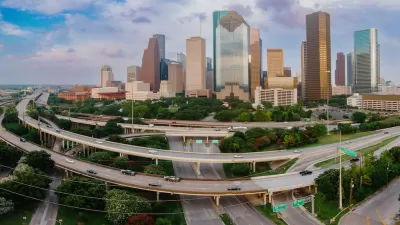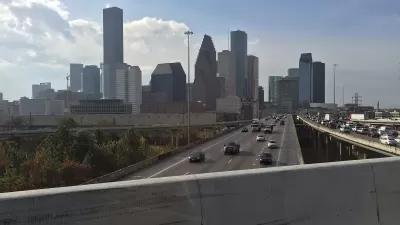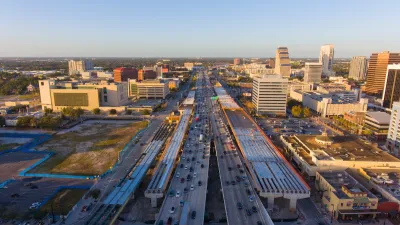Opportunities abound for Houston to capitalize on otherwise unused space beneath its wide network of freeways.

With the numerous wide freeways throughout the City of Houston, it's becoming more apparent that the space beneath the many overpasses can, and should, be made multifunctional. In cities like Houston where space is limited, these spaces can be reimagined to provide shade, shelter from rain, and safe under-crossings for pedestrians and cyclists. Even adding simple interventions such as lighting or a splash of color to the environment can help make space underneath freeways more attractive and safer.
As Dug Begley explains in a Houston Chronicle article, public officials are engaging with communities to get a better understanding of how these spaces can best benefit the surrounding neighborhoods and residents. Options include parking, trails, vegetation, stormwater detention, and programmed park space.
The article highlights the importance of minimizing unused or wasted space. Communities within the U.S. and around the globe have already started repurposing beneath freeway spaces for a wide variety of uses including recreation, public art, and playgrounds. With a changing climate that is making summers increasingly hotter, these spaces represent prime opportunities to take advantage of already shaded areas. Engaging with communities to reimagine these spaces can also signify a step in building trust with the surrounding communities, some of which may have been disproportionately impacted by the presence of the freeways. Even with minimal intervention, programming, and maintenance, these under-crossings can show subtle “cues to care” that will increase the perception of safety and signify investment. Houston, as well as other communities strapped for space, should continue to take advantage of the many benefits and options that these unique places can provide.
FULL STORY: Houston has a ton of freeways. And a big opportunity to reimagine the space underneath them.

Alabama: Trump Terminates Settlements for Black Communities Harmed By Raw Sewage
Trump deemed the landmark civil rights agreement “illegal DEI and environmental justice policy.”

Planetizen Federal Action Tracker
A weekly monitor of how Trump’s orders and actions are impacting planners and planning in America.

How Atlanta Built 7,000 Housing Units in 3 Years
The city’s comprehensive, neighborhood-focused housing strategy focuses on identifying properties and land that can be repurposed for housing and encouraging development in underserved neighborhoods.

In Both Crashes and Crime, Public Transportation is Far Safer than Driving
Contrary to popular assumptions, public transportation has far lower crash and crime rates than automobile travel. For safer communities, improve and encourage transit travel.

Report: Zoning Reforms Should Complement Nashville’s Ambitious Transit Plan
Without reform, restrictive zoning codes will limit the impact of the city’s planned transit expansion and could exclude some of the residents who depend on transit the most.

Judge Orders Release of Frozen IRA, IIJA Funding
The decision is a victory for environmental groups who charged that freezing funds for critical infrastructure and disaster response programs caused “real and irreparable harm” to communities.
Urban Design for Planners 1: Software Tools
This six-course series explores essential urban design concepts using open source software and equips planners with the tools they need to participate fully in the urban design process.
Planning for Universal Design
Learn the tools for implementing Universal Design in planning regulations.
Jessamine County Fiscal Court
Caltrans
Institute for Housing and Urban Development Studies (IHS)
City of Grandview
Harvard GSD Executive Education
Toledo-Lucas County Plan Commissions
Salt Lake City
NYU Wagner Graduate School of Public Service





























